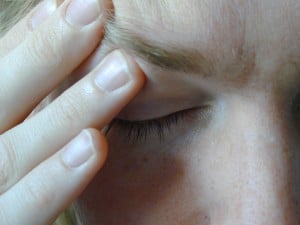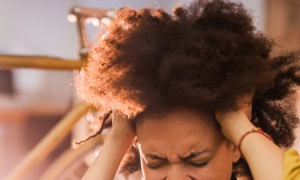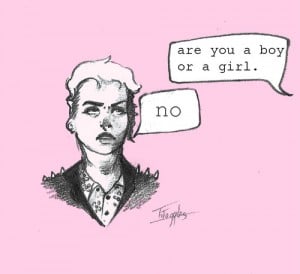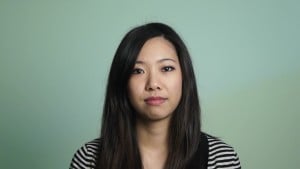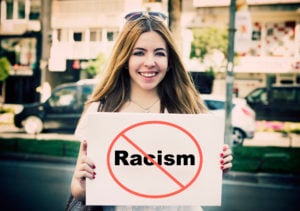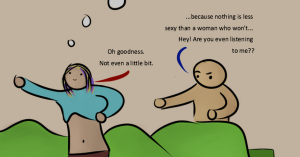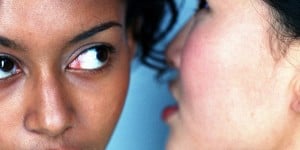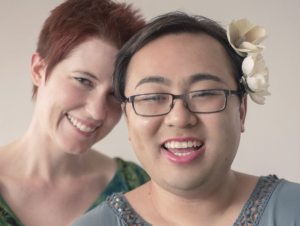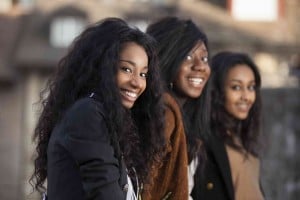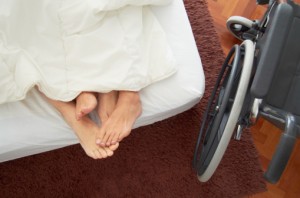
Source: Getty Images
Originally published on Autostraddle and cross-posted here with their permission.
I’m a virgin.
Not only do I lack any sexual experience, but I have no romantic experience to speak of either. We’re talking 12-year-old, pre-spin the bottle levels of physical intimacy here.
Of course, there’s nothing wrong with this, assuming that it’s your choice. There are a million reasons to take relationships at your own pace.
Where it starts to be a problem is when you recognize that you possess and want to express these desires, and society denies them.
Worse, society takes the authority upon itself to deem you undesirable and ascribes a complete and total sexual absence to you and your entire community at large, with few exceptions.
My name is Erin, and I’m a graduating college senior majoring in Film and minoring in LGBT Studies. I self-identify as a queer feminist who believes that personality/aesthetic/confidence wins out over anatomy in terms of who you love.
I also happen to have a disability – cerebral palsy.
My disability is very visible in that I use an electric wheelchair for daily transportation.
Today, I wanted to talk to you all about the ways in which being a disabled woman has shaped my romantic and erotic (mis)adventures.
Before we get started, a few things:
1. I want to discuss my use of the word “cripple,” which is obviously a loaded term and can be triggering for many people.
It’s important to recognize that I use this term in a political sense and as a means of radical reclamation of a positive self-identity.
It might make you cringe, but I want you to embrace the discomfort. Pain and repression can incite crucial discussions.
If we can resist our natural impulse to avoid negativity by trying to paper over and redeem subjects that make us upset, we might start to see some actual change.
2. At no point do I ever claim to speak for the entire disabled community.
I acknowledge that my perspective is shaped by a specific set of biases that other individuals with disabilities may or may not share.
3. On that note, I am fully aware that there are many disabled people that enjoy active, fulfilling sex lives.
Just because no one has yet deemed me bangable does not mean that I think all individuals with disabilities are doomed to perpetual sexual Siberia indefinitely.
However, my experience is valid, and I would hate to see it belittled or swept under the rug under lofty promises of love, acceptance, and progress.
I’m not here for pie in the sky. I’m here for right here, right now, and everything that has influenced me up to the current moment.
With nervous trepidation, I awaited the move all the way across the country to California. I had lived my entire life in an incredibly rural area of Pennsylvania, and so I was eager to prove to myself that my relative lack of a social life or love interest was a result of being stuck with the same people and needing transportation to get just about anywhere.
Berkeley is known for its socially liberal attitudes as well as being the epicenter of the disability rights movement, so I anticipated that I could manage to scrounge together a clique somewhere.
First, I determined that I needed to find a boyfriend in order to experience all the connection that high school seemed to deny me. Through online dating, I went on a few comically disastrous blind dates, little half-baked cyberspace petri dishes of human connection that never seemed to gain traction in real life.
Either they would realize I was disabled and power through it, or I would tell them beforehand and they would stop talking to me or avoid opportunities to meet.
My discovery of my own queerness served to multiply the prejudice that I encountered, rather than providing me a safe haven from it.
I joined my college’s queer-straight alliance initially as a straight ally (lolz) and rapidly developed a crush on a girl.
Thus began a long, equally unsuccessful stint of pining after women.
Given the message of acceptance and sex positivity that the queer community so openly espouses, I was hopeful that I had finally found a niche where my sexuality would be respected and validated. To my dismay, the same passive discrimination was alive and well.
In the event that infantilization proved inadequate, some would disguise their aversion to disabled sexuality with good old-fashioned biphobia.
My most recent crush, made painfully aware of my feelings after a night of drunken confession, dodged the subject by insisting that I would date a woman for a few years and then inevitably leave her for a man.
When I protested that I would never leave a committed relationship on the basis of gender alone, she said I had no way of knowing that because I had never slept with a man.
She was so desperate to escape the discomfort of acknowledging me as having romantic capacity that she created an obscure hypothetical to pigeonhole me as the untrustworthy, promiscuous bisexual while paradoxically virgin-shaming me. (Fun plot twist: She began dating an able-bodied bisexual woman soon after this conversation.)
I finally had to swallow the bitter pill that the reason I was never considered a viable partner was not because I failed to conform to some outdated criteria for heteronormative womanhood, but because individuals with disabilities are viewed as children and sexual nonentities through the eyes of all beholders across the sexuality spectrum.
Many of my caretakers and friends insist that I could have a love life if I would only date disabled people and proceed to combat my hesitation point by point if I object.
The problem is that the logic of disability dating follows the rather simplistic formula of like goes with like. In my case, this boils down to wheelchair goes with wheelchair.
I’m not opposed to dating someone with physical impairments in the abstract, but I resent the notion that other people in wheelchairs are my only option and that I’m “uppity” if they’re not my type.
By insisting that disabled people should only date those with similar disabilities, the able community not only reaffirms their perception of our undesirability, but indirectly admits that they fail to view us as having any kind of adult sexuality at all.
Here’s where the myth of the bitter crippled virgin comes into play.
If disabled individuals are accused of rejecting sexual options, we are often held responsible for our own repression.
The unfortunate thing is that usually the only group that recognizes the sexual capacities of disabled people is the disabled community itself, which ironically has the greatest difficulty in building a sexual exchange as an outlet of this appreciation due to the prominence of physical barriers.
The challenge then lies in cultivating and claiming romantic and sexual viability in an able world determined to infantilize you.
In the past, I depended on strict adherence to gender expression as a way of using femininity to overcompensate for my lack of assumed sexuality. This proved frustrating and ineffective on many levels.
On one hand, presenting in a hyper-feminine fashion apparently confirmed the collective perception that I was just an adorable little girl.
In retaliation, I went to the opposite end of the spectrum at night and would dress very provocatively to go to parties as part of a “I will force you to see me sexually, dammit!” mentality.
I once went to a party in a black and red corset with matching fishnets. Throughout the night, I had at least five people come up and ruffle my hair to tell me cheerfully that I looked great.
Even at my most overtly sexualized, I could still only manage to conjure up the image of a seven-year-old walking around in her mother’s high heels.
Eventually, I realized that my quest would be much more complicated.
As someone with a deep love and respect for femininity as a personal expression of style, self-confidence, and social presence, the revelation that I wouldn’t be able to combat decades of cultural stereotypes with the right dress and a dab of red lipstick was devastating.
It goes without saying that appearance isn’t everything, and I have much greater pride and value in my intellect, but I have difficulty sharing my interior self with others if they’re so quick to write me off on snap judgments of my exterior.
As a result, I spend most of my time trying to counteract the social stigmas that accompany the physical presence of my chair.
The chair seems to suggest a medicalized microcosm that must mean its user is devoid of romantic or sexual impulses because of their assumed lower quality of life.
Regardless of how much individuals will probably agree that disabled people have the right to their own sexuality, that doesn’t mean that the prevalence of these stereotypes doesn’t affect our lives and relationships on a daily basis.
By assigning the designation of bitter crippled virgin, able society attempts to absolve itself of guilt and accountability for disabled sexual repression.
If they can somehow make our discontent a function of our own flaws, they don’t have to examine themselves.
If we could just be happier, just be more passive, just not worry about it, all of our problems would be solved.
There is one simple, glaring error in this train of thought: Society can’t pathologize the individual for responding to conditions that society itself has constructed and reinforced.
The bitter crippled virgin becomes a cautionary tale to promote quiet assimilation and prevent critical examination of the forces that cause us to continually be perceived as always a little bit less than human.
There is no such thing as the bitter crippled virgin.
This myth acts as an ugly mask to obscure those individuals with disabilities who are courageous enough to acknowledge social inequality and demand their right to sexual expression.
Unlike the myth, their efforts are vibrant and very, very real.
Want to discuss this further? Login to our online forum and start a post! If you’re not already registered as a forum user, please register first here.
Erin Tatum is a queer disabled college student currently residing in Berkeley, CA. She is particularly interested in representations of queerness and disability in media. She hopes to advocate for more numerous positive portrayals of marginalized identities in television and film. Follow her on Twitter @erintatum91.
Search our 3000+ articles!
Read our articles about:
Our online racial justice training
Used by hundreds of universities, non-profits, and businesses.
Click to learn more
Most Read Articles
- « Previous
- 1
- …
- 30
- 31
- 32





